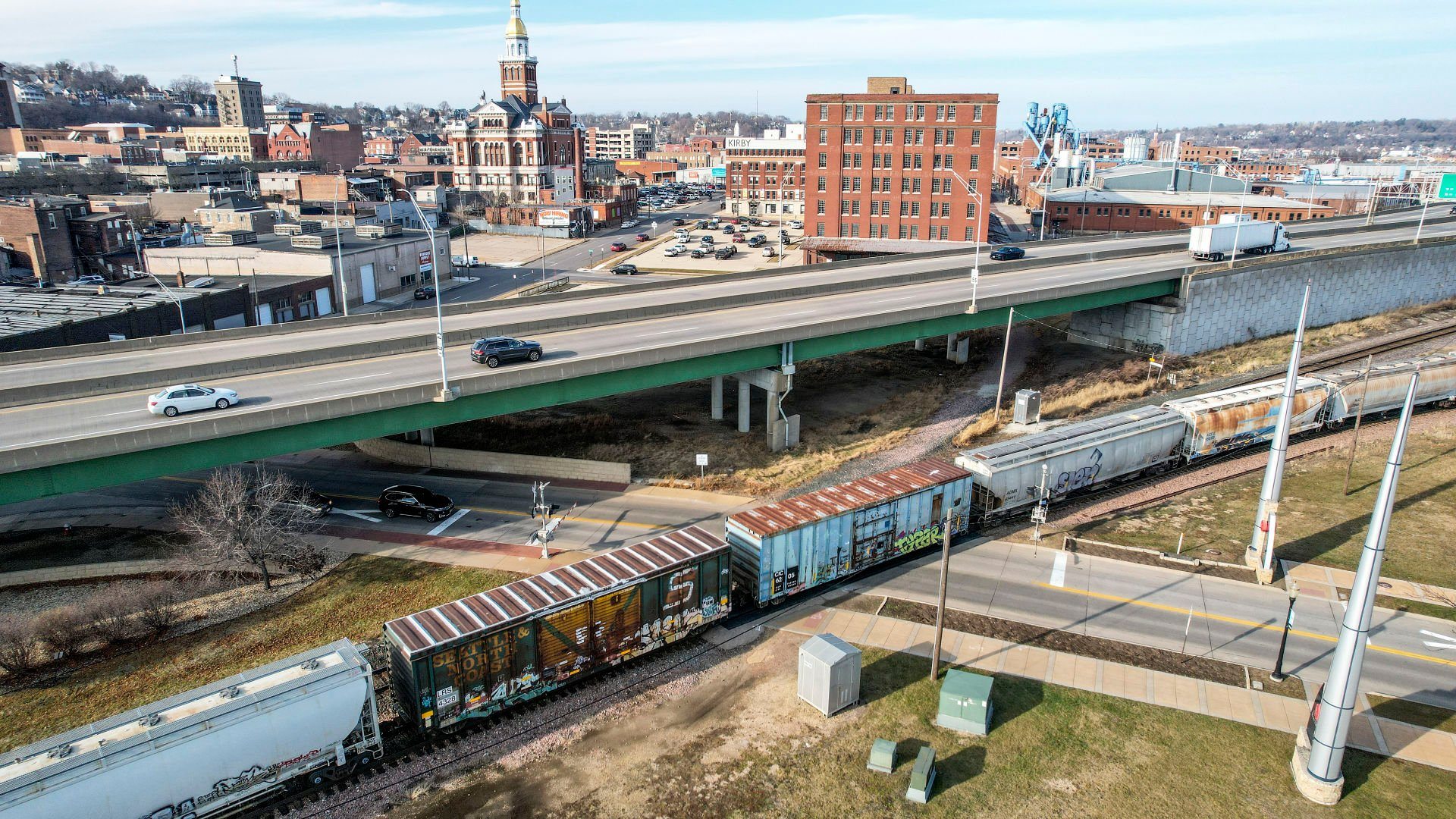For a detailed map displaying the impact of the merger on local communities, visit https://tinyurl.com/yckt2ns4.
Railroad tracks cut through the heart of Bellevue, Iowa, practically splitting the city in two.
When a train passes through the small community, motorists wait patiently to cross from one side of the city to the other.
For now, the number of trains that pass through Bellevue each day is small enough to be manageable. However, a potential merger between two major rail lines could dramatically increase that count, and local officials are concerned about its potential impact.
“Our biggest concern is for the safety of residents,” said Bellevue City Administrator Abbey Skrivseth. “We don’t want a situation where the traffic becomes too bottlenecked and emergency crews get stuck on one side of the track.”
Canadian Pacific Railway, which operates rail lines that run through Bellevue, Dubuque and Guttenberg, Iowa, is in the midst of acquiring another major railway, Kansas City Southern, in a deal valued at $31 billion.
The merger still requires approval by the federal Surface Transportation Board, which is reviewing the proposal. A decision is not expected until late next year.
If approved, the merger likely would greatly increase train traffic on the line that runs from Sabula to Marquette in eastern Iowa and through Bellevue, Dubuque and Guttenberg.
The Surface Transportation Board estimates that without the merger, those communities would have an average of 11.5 trains passing through per day by 2027. With the merger, that number increases to nearly 18 trains per day.
When reached by the Telegraph Herald, officials with Canadian Pacific stated in an email that the merger would benefit the environment by reducing greenhouse gas emissions through improved operational efficiency and improve the economy by creating about 1,000 rail jobs. The company added that it is willing to work with local communities to lessen the impact of increased train traffic.
“While the overall impact of the CP-KCS transaction is unambiguously pro-environment and pro-economic growth, we recognize that we will be increasing the number of trains that operate through some communities,” the company stated in an email. “We will work hard to be a good neighbor and mitigate potential adverse community impacts.”
Many Dubuque residents already contend with trains passing through the city, sometimes stopping completely and halting traffic on major roadways, such as 16th Street. To remedy the issue, city officials are currently exploring the construction of an overpass on East 14th Street, which would cross over the railroad tracks.
City Manager Mike Van Milligen said he and city staff have communicated with Canadian Pacific on the potential merger and that the rail line’s staff promised to make efforts to mitigate the increase in train traffic if the merger is approved.
“They are installing new electronic systems on their tracks, which would allow centralized traffic control to make sure they operate as efficiently as possible,” Van Milligen said.
He said city staff also will try to get Canadian Pacific to help pay for that new overpass, which would further reduce the traffic impact on residents. Van Milligen said the completion of that project still relies on securing federal funds from the recently passed federal Infrastructure Investment and Jobs Act.
“We do hope to convince them that they ought to help us on the funding with the overpass,” Van Milligen said.
Dubuque officials also are concerned about the potential increase in noise created by the added train traffic. Van Milligen said he is working to have Canadian Pacific create a “quiet zone” for Dubuque, which would prevent trains from sounding their horns, except in emergency situations, when passing through the city.
In Bellevue, there are eight railroad crossings for residents to use to get from one side of the city to the other. If the merger is approved, Skrivseth said, she will request that Canadian Pacific open up two additional crossings — on Spring and Spruce streets — that were previously closed by the rail line.
“That would help some of the stress that we would experience on other crossings,” she said.
Skrivseth said she also is asking the rail line to maintain the city’s already established “quiet zone.”
However, Skrivseth said she and other city officials still are concerned about increases in traffic congestion and noise created by the added train traffic. Most importantly, there is concern for police and firefighters who could be delayed in responding to an emergency because of train traffic.
Guttenberg officials shared similar worries about the merger. Mayor William Frommelt said he believes an increase in train traffic will create significant disruptions for the community.
“The train tracks basically separate our town,” he said. “If the trains are becoming longer and more numerous, it could become an issue.”
Frommelt said city officials have not yet discussed the merger with Canadian Pacific officials.


